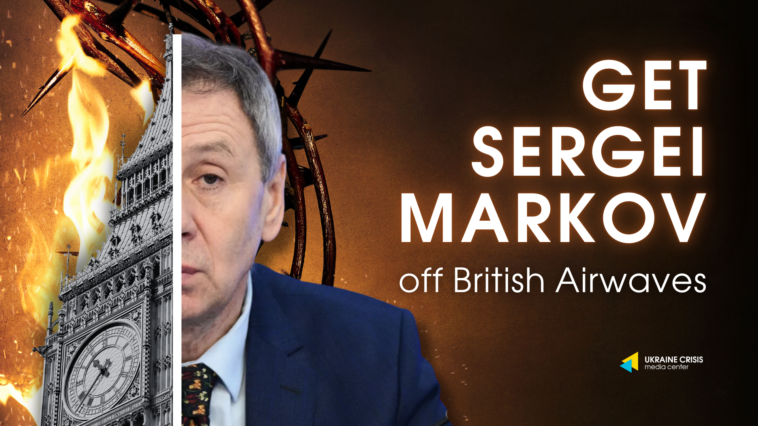Written by Matt Wickham, UCMC/HWAG analyst
Once again, Sergei Markov, a long-standing propagandist in the Kremlin’s arsenal, has made it onto UK airwaves. This time on Times Radio, with the segment being reposted on its YouTube channel and gaining over a huge 300,000 views.
Despite veteran British journalist Adam Boulton dismissing Markov’s Kremlin-sponsored rhetoric, the damage has been done.
The Kremlin’s mouthpiece has seized yet another opportunity to broadcast its nuclear saber-rattling threats to the British public in his most viewed english interview yet.
The recurring issue is the UK media’s bewildering decision to feature Sergei Markov, who has made multiple appearances on many UK News channels throughout the Russia-Ukraine war.
This latest appearance on Times Radio represents another victory for the Kremlin, aligning perfectly with its hybrid warfare tactics since 2014 and undermining the progress the UK has made in limiting Russian propagandists’ reach by banning channels like RT (which plays a key role in Russian intelligence operations globally) and reducing their visibility on platforms such as YouTube.
UCMC reached out to the Times Radio for comment, but no response was received.
Several things are immediately wrong with the interview—beyond the fact that it shouldn’t have happened at all. Firstly, Markov was introduced as a political scientist and a close advisor to Vladimir Putin. Let’s unpack that.
It’s hard to call Markov a political scientist given his track record of promoting propaganda and conspiracy theories. While such tactics might boost one’s career in Russia, they have nothing to do with genuine political science. Second, Markov currently has no official ties to the Russian government.
He’s essentially a nobody—a ranting lunatic whose theories are so extreme that even Russia’s propaganda talk show 60 Minutes rarely extends an invitation to him. So Boulton’s introduction is, frankly, misleading.
Moreover, the claim that he is a close advisor to Putin refers to 2012, when Markov had some respect and a sliver of influence. He has long been sidelined from any decision-making process and now operates independently, propagating his own narratives that fit the Kremlin’s agenda.
The real issue is that British audiences, who, let’s be honest, lack a deep understanding of Russian politics, are misled into perceiving Markov as a credible source from the outset of the interview.
It’s almost ironic that even later in the interview, Markov himself indirectly refutes these claims of his “close ally to Putin” introduction by admitting he is not privy to top-secret information and thus not “in the know.”
Markov’s focus during the interview was on transmitting the Kremlin’s nuclear threats, a common Kremlin tactic to instill fear and undermine the UK’s support for Ukraine’s strikes on Russian targets deep within Russian territory.
So, why are these major media platforms engaging with Markov? What do they possibly gain from it? Balanced journalism? Hardly.
Inviting Sergei Markov onto UK airwaves under the guise of “balanced journalism” is a blatant example of false balance. By presenting him as a Kremlin official close to Putin, the media is legitimizing Kremlin propaganda and misrepresenting the truth.
What’s more, Markov is known for his extremist views, including his 2014 statement that “Having sex between man and woman: normal. Having sex between man and man: not normal. Everybody knows this. Including gays,” and his regular claims that the Ukrainian government is a Nazi regime. Balanced journalism?
Moreover, his recent Telegram post suggests that the UK is plotting strikes on “Russian cities” simply because the British are “Russophobes”. However, the reality is that there won’t be strikes on “Russian cities,” as Markov is trying to transmit, only on strategic military and lawful targets after Russia’s illegal invasion.
With regards to “Russiaphobes” in the UK, its worth mentioning the Conservative government’s (no longer in office) long infatuation with Kremlin money.
Even after the Kremlin’s illegal operations—such as the Litvinenko and Berezovsky assassinations and the Skripal poisoning, and Russian SVR operations that put huge numbers of the British population at risk due to radioactive contamination—Boris Johnson, when serving as Foreign Secretary in 2018, had a rather cozy relationship with Russian Evgeny Lebedev, owner of the paper “Evening Standard”.
Later revealed that Lebedev’s father was a former KGB agent once stationed in London and has since faced Ukrainian and Canadian sanctions for his continued contribution to tourism in Russia-occupied Crimea.
Despite support for Ukraine’s defense, the Conservative government’s approach to Russian influence remains questionable and Markov’s claims of Russophobia in London seem increasingly unfounded.
And so, don’t British media outlets have an ethical responsibility to avoid amplifying harmful or misleading content, not being a platform for it?
Markov’s inclusion on Ukraine’s sanctions list in 2018 for urging Ukrainian security forces to defect to Russia and his addition to Canada’s sanctions list in 2022 for supporting Russia’s invasion of Ukraine should be more than enough to justify halting his appearances on British airwaves.
But it also raises the question: why is he not sanctioned by the UK and instead speaking to the British public?
I doubt that his appearance is an attempt by British media to remain “impartial.” It’s either that these media professionals (interview bookers) who have invited Markov on, either lack an understanding of how the Kremlin’s hybrid warfare operates or fails to grasp how influential an interview with someone like Markov can be—resulting in complications for UK government decisions regarding Ukraine.
Or, and I hope this is the case, it’s an effort to showcase Markov as the ranting lunatic with broken English and a thick Russian accent that he is, highlighting the absurdity of the Kremlin’s narratives and portraying Russia’s political scientists as a joke.
One can only hope…

